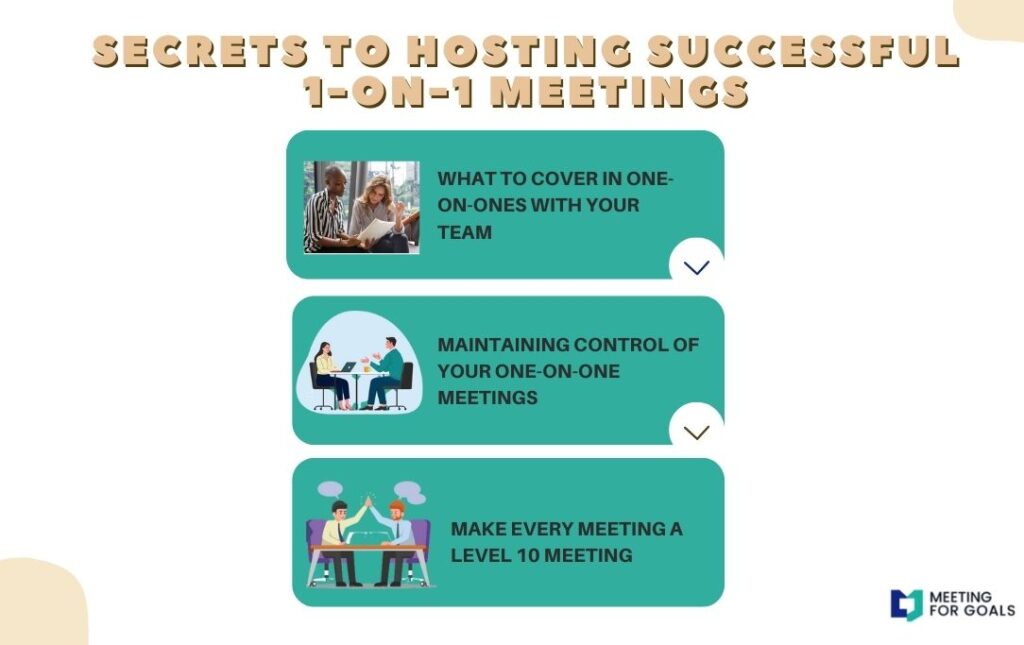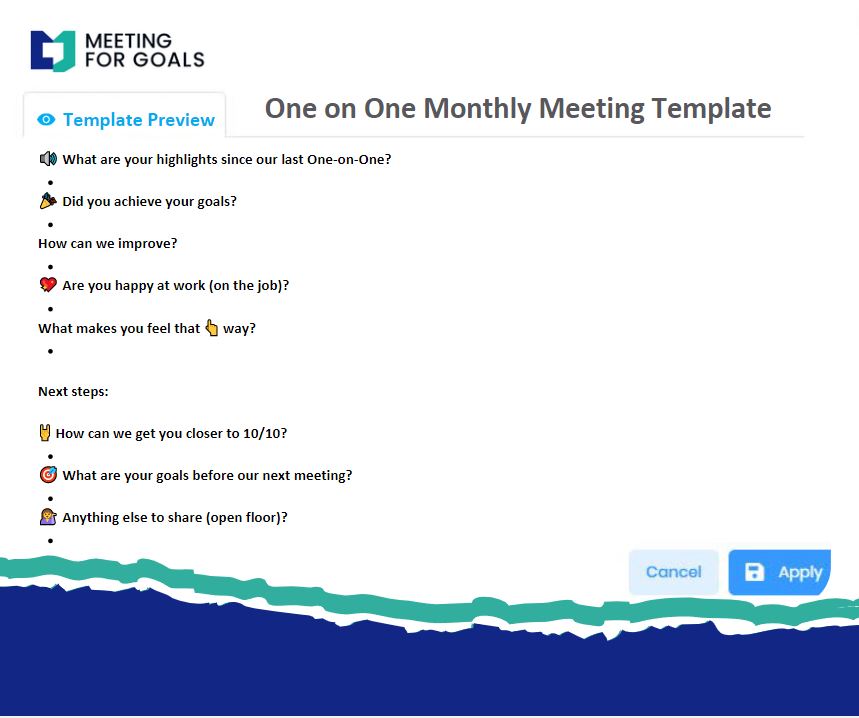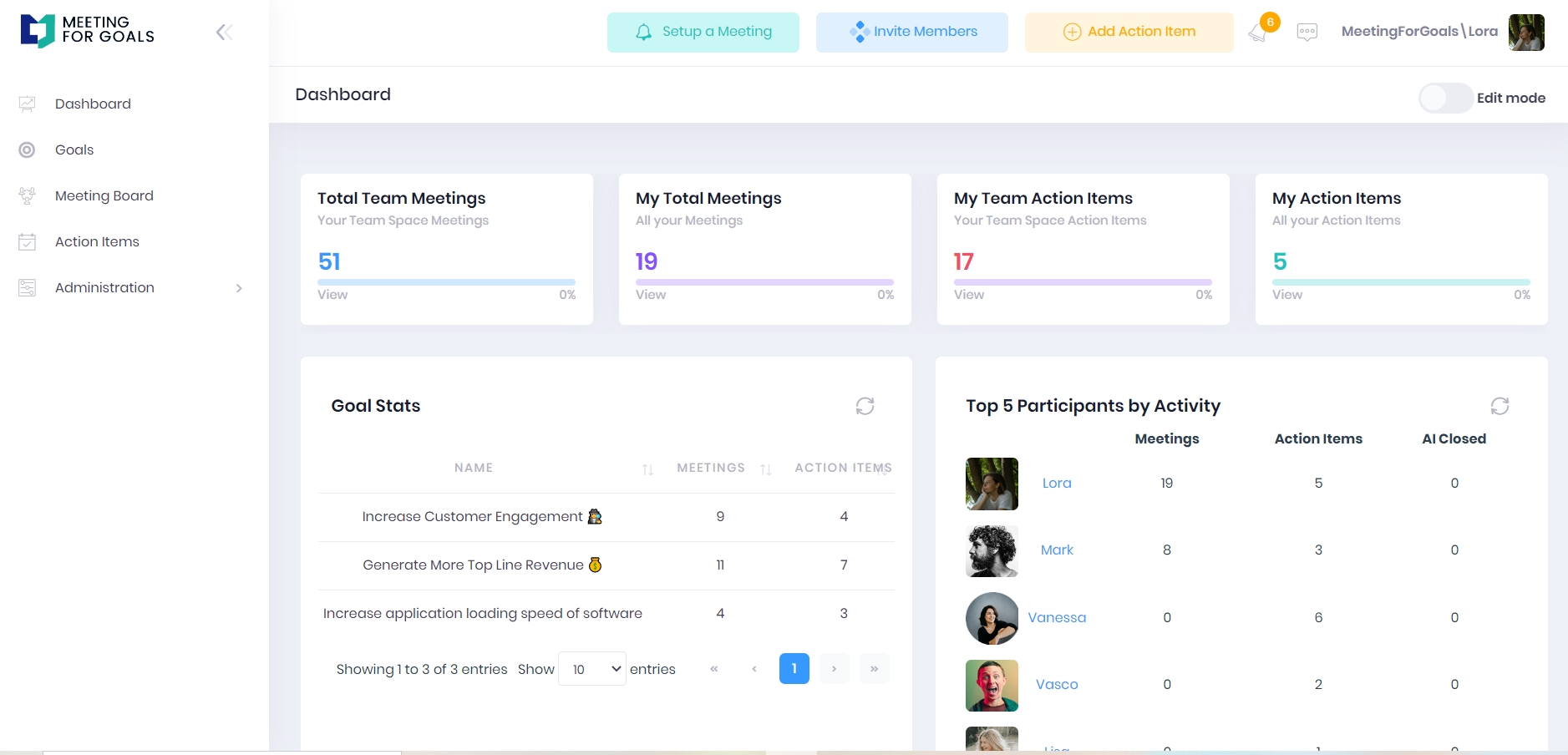The Secret to Hosting Successful One-on-One Meetings

Table of Contents
When you operate a small or mid-sized business, taking time to communicate with your team members is a crucial key to success. And with as many as 25% of Americans working remotely in 2021, the need for one-on-one meetings via Skype, Teams, Zoom or other means has grown exponentially and continues to do so.
While meetings are an important part of business communication, their significance is often staled when there’s no meeting agenda or when discussion topics don’t focus on meeting your organization’s goals. So, how do you redirect your one-on-one business meetings to make sure your team members are on the same page?
In this guide, you’ll learn to make every meeting a level 10 meeting by using a comprehensive meeting agenda that incorporates goals, objectives and clear communication techniques.
Agenda Definition: According to Merriam-Webster, an agenda is defined as, ” a list or outline of things to be considered or done.”
When it comes to one-on-one meetings, your agenda should include a list of discussion topics, which may include project updates, action items, employee feedback and any information that’s pertinent to the employee you’re meeting with.
The Importance of 1-on-1 Meetings
One-on-one meetings are a great way to connect with your employees, but they can also give you the opportunity to connect with others in your organization that aren’t part of your direct team. Whether you’re meeting to provide an employee with an annual review or having a skip level meeting with another manager or supervisor within your organization, a one-on-one meeting helps you ensure that everyone’s working toward a common goal.

What To Cover in One-on-Ones With Your Team
Many managers report having weekly one-on-one check-ins or weekly sync-ups with their team members, while some claim to have these meetings bi-weekly. We like to spend around 30 minutes in each one-on-one which helps cover enough ground.
Although these meetings are a great opportunity to build camaraderie with your employee, it’s also vital to your business’s productivity that they stay on track. Make sure your employee is comfortable enough to carry on an honest conversation with you, but don’t become so familiar with them that their respect for you wavers.
As a manager or business owner, it’s important to go in with an agenda and stay in control of your meeting. Using a meeting agenda planning tool, such as Meeting For Goals, can help you make sure the goals of your meeting are aligned with the goals of your organization.
When it comes to weekly or bi-weekly meetings that are intended to help you and your employee touch base, limit the icebreaker-style morning meeting questions and try to go straight to check-in questions.
These meetings also provide you with an opportunity to review key performance indicators (KPIs), as well as objectives and key results (OKRs).
OKRs vs. KPIs
While these terms are often used interchangeably, there are differences between them. KPIs are performance metrics that provide you with an indication of your employee’s performance — they can be in the form of sales goals, SEO metrics or their ability to meet milestones. OKRs, on the other hand, are goals or objectives that are less focused on metrics and more focused on actions that drive the objective.
The GOOD Method
The GOOD meeting method can help you keep your one-on-one meetings on track, whether they’re regular check-ins or performance reviews.
Using this method, your conversation should focus on:
- Goals
- Obstacles
- Opportunities
- Decisions
While a performance appraisal will focus on the goals, obstacles, opportunities and decisions regarding the employee’s overall career in your organization, weekly or bi-weekly check-ins can focus on the goals, obstacles and opportunities they’re faced with when tasked with a specific project. In the end, you and your employee should work together to make final decisions about any required actions.
GOOD Questions to Ask in a Meeting
There are several questions you can ask your team member during one-on-one meetings that will help you follow the GOOD method. These include:
- How are you tracking your progress in this project?
- Do you need extra support to meet project milestones or overall project goals?
- Are there any obstacles to successfully completing this project?
- What are you most proud of in this project, so far?
- Are there any opportunities for improvement?
- What do you want to learn from this project?
- Have your priorities in this project changed? And if so, why?
Maintaining Control of Your 1-on-1 Meetings
As a leader in your organization, it’s your responsibility to ensure that you’ve got control of your meetings. That doesn’t mean you shouldn’t give your employee the opportunity to speak, though. Instead, it means asking the right questions and actively listening to your employee’s needs, concerns and personal goals.
Make Every Meeting a Level 10 Meeting
Your one-on-one meetings, and even your group meetings, can be more productive and focused with a proven meeting agenda template.
Use Meeting For Goals to clearly define the goals of your organization, your employees and your meetings. Using this software, you can easily take control of your meetings, take minutes for a meeting and share them with attendees immediately after. Sign up to access this convenient program today!
Meetings That Get Results, For High Performing Teams

Meeting For Goals Editorial Team
Meetingforgoals helps teams eliminate useless meetings that do not advance the company goals. Our software helps you align meetings to company goals, to have a meeting agenda, allocate action & responsibility and save time. Never have a bad meeting again 💪

How To Reduce Meetings in the Workplace
Introduction Every manager has been in a meeting that went on way too long, or spent too much time discussing things that could have been

Tips to improve your meeting culture & Symptoms of bad meeting culture
Introduction Meetings are an essential part of every company’s life, but they can also be a huge waste of time. The good news: with some

Why are meetings important? Their Advantages & Tools to Have Great Meetings
Why Are Meetings Important & The Importance of Meetings Introduction Meetings are a cornerstone of effective teamwork and organizational success. Whether it’s discussing new strategies,

